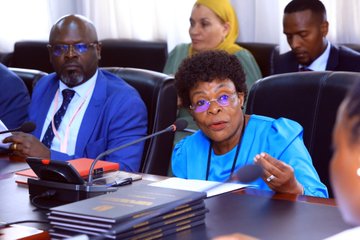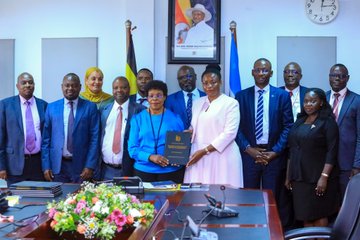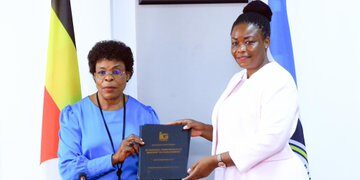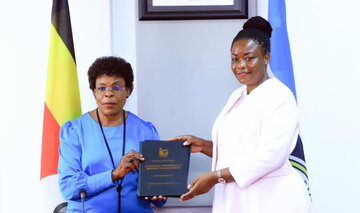The Inspectorate of Government has recovered Shs4.2 billion from corrupt individuals and entities across Uganda in just six months, marking a significant step in the fight against corruption.
The milestone was revealed on Monday as Inspector General of Government (IGG) Beti Kamya presented the July–December 2024 Bi-Annual Performance Report to Parliament.
The report, submitted in line with Article 231(1) of the Constitution, outlines extensive efforts by the Inspectorate to investigate corruption, enforce administrative sanctions, and reclaim public funds. Speaker of Parliament, Rt. Hon. Anita Among was represented at the event by Parliamentary Commissioner Hon. Esther Afoyochan, who pledged continued legislative support and advocacy for increased funding to the IGG’s office.
“I commend the IGG for her steadfast efforts. I will make a strong case in Parliament for adequate budgetary support to enable the institution to deliver fully on its mandate,” Hon. Afoyochan stated.

The report details the recovery of Shs4.2 billion, part of a total of Shs8 billion recommended for recovery from various ministries, departments, agencies (MDAs), and local governments. The investigations also led to 600 administrative sanctions and the recommendation of 16 officials for prosecution.
Among the 18 high-profile cases investigated were those involving the Ministry of Tourism, Uganda Revenue Authority, Uganda Electricity Transmission Company Ltd, Electoral Commission, and Kampala Capital City Authority (KCCA). Charges ranged from abuse of office and embezzlement to misappropriation of funds and causing financial loss.
IGG Kamya credited the increased recovery to improvements within the institution: “There has been a significant rise in concluded investigations, funds recovered, and conviction rates. This is due to internal reforms like prosecution-led investigations and greater citizen engagement,” she said.
Kampala named the most corrupt district
The report also named Kampala as Uganda’s most corrupt district, with 253 corruption cases, followed by Wakiso (56), Mbale (44), Masaka (34), and Mukono (32). Kampala also topped the previous report covering January to June 2024, suggesting persistent integrity challenges in the capital.

At the other end of the spectrum, Buhweju, Bukedea, Kalaki, Karenga, Luuka, and Nabilatuk recorded the lowest incidences, with just one case each.
In total, the IGG received 1,347 complaints, of which 1,193 were sanctioned for investigation and 1,267 cases concluded. These included 552 corruption-related, 391 Ombudsman, and 324 Leadership Code breach cases.
Kamya used the platform to appeal for increased funding to the Inspectorate, highlighting that more resources would enable more robust enforcement and expand efforts to curb corruption, especially at the grassroots level.
“To effectively fulfil our constitutional mandate and ensure more recoveries, we need stronger financial support,” she urged.
Parliament’s next budget discussions are expected to reflect renewed urgency in empowering the IGG to sustain this momentum.









